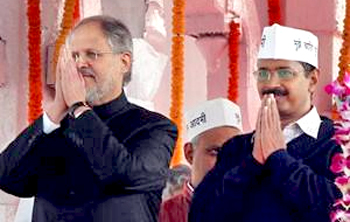New Delhi, Jun 2: The AAP government's decision to induct five police officers from Bihar in the Anti Corruption Branch has kicked off a fresh row, with the Delhi lieutenant governor saying any such move will need his prior sanction.

Reacting strongly to the move, the LG's office said in a statement, "The Anti Corruption Bureau (ACB) Delhi...functions under the authority, control and supervision of the lt governor, a position that has also been clarified by ministry of home affairs".
It also stated that the office of the lt governor has so far not received any proposal for the deputation of Bihar Police personnel from outside Delhi Police.
"The office of the lt governor has so far not received any proposal for the deputation of such personnel from outside Delhi Police. The matter will be duly examined as and when the lt governor receives the formal proposal from the vigilance department of Delhi government," LG office also said.
A request for the Bihar Police officers was recently sent by Delhi government, following which the five officers were dispatched.
The AAP government and the lt governor Najeeb Jung have been involved in a public spat over his powers vis-a-vis an elected government. The Centre had on May 21 issued a notification siding with Jung.
Speaking at the assembly session recently, Kejriwal had said that the notification conferring more powers on Najeeb Jung was part of an "experiment" to take the country towards "dictatorship."
In the notification, the Centre had given absolute powers to the LG in appointment of bureaucrats while also clarifying that he need not "consult" the chief minister on subjects like police and public order.
Kejriwal had recently conveyed to chief ministers of Bihar, UP and West Bengal among others that the Centre's notification, throwing its weight behind the Lt Governor, was "detrimental" to India's federal structure and it may happen to their states as well.
Delhi Police and ACB have recently come face to face after some of the former's men were arrested by the anti-graft unit for allegedly accepting bribe.
The move to induct policemen from Bihar also seems to be aimed at reducing ACB's reliance on Delhi Police as till now all its officers were derived from them.
"One has to keep the home ,inistry in loop if government employees of one state are sent to work in another state, In this case, it must be the LG. We don't know whether the LG or the MHA is in loop in this connection," said a senior government official.





Comments
Add new comment